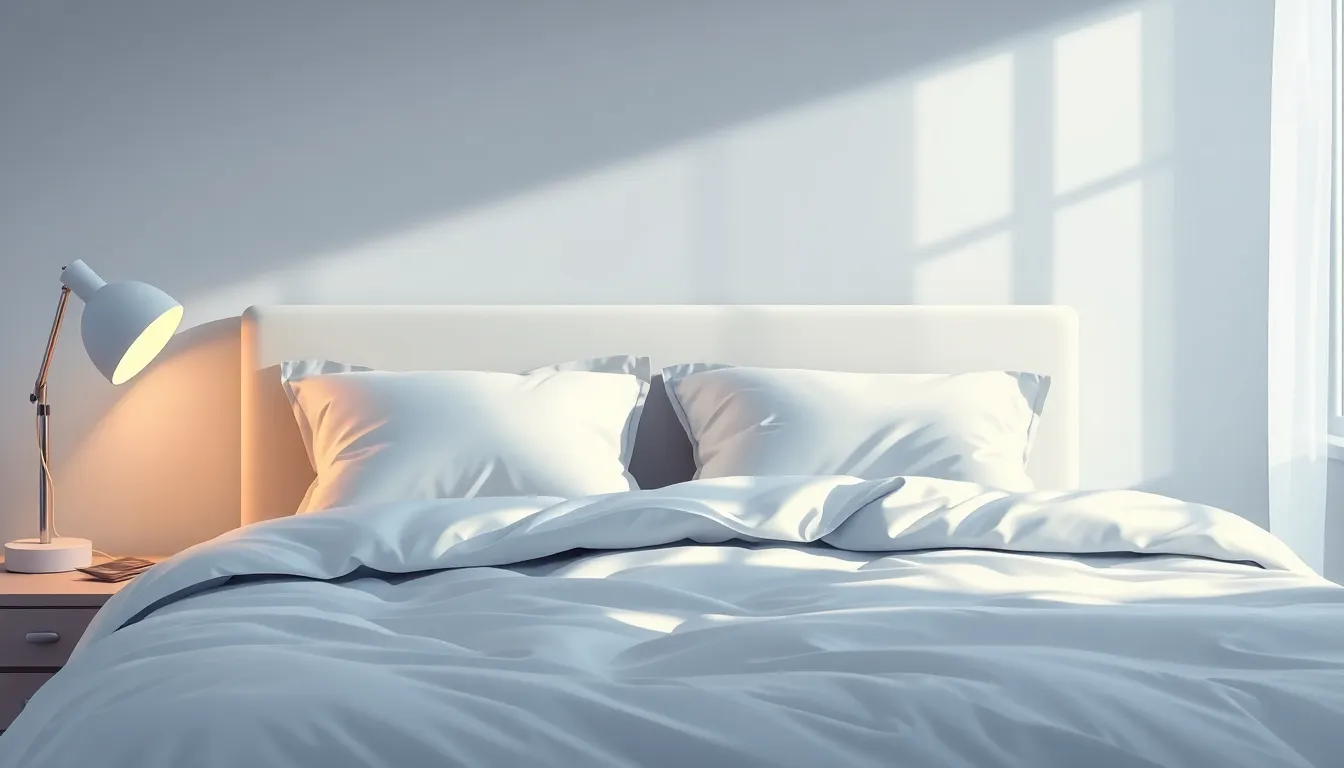In a world where sleep often plays second fiddle to Netflix binges and late-night snacking, restoring those precious Z’s can feel like a Herculean task. Yet, quality sleep is the ultimate secret weapon for boosting mood, productivity, and even creativity. Who wouldn’t want to wake up feeling like a superhero ready to conquer the day?
Table of Contents
ToggleWhat Is Restore Sleep?
Restore sleep refers to a deep, uninterrupted sleep that significantly enhances both physical and mental well-being. It’s characterized by slower brain waves and reduced body temperature, which facilitate restorative processes essential for optimal health. This critical stage of sleep aids in memory consolidation, emotional regulation, and physical recovery.
During restore sleep, the body repairs tissues, builds bone and muscle, and strengthens the immune system. Quality sleep can lead to increased hormone regulation, including the production of growth hormones vital for development and maintenance. Restoration doesn’t just occur on a cellular level; it also influences cognitive functions, allowing for improved concentration and decision-making.
Notably, the recommendations for adults suggest 7 to 9 hours of sleep per night for optimal health benefits. Factors such as stress, technology use before bed, and irregular sleep schedules can disrupt this restorative phase. Prioritizing sleep hygiene by establishing a bedtime routine can enhance the quality of restore sleep.
In addition, sleep environments play a role. A comfortable mattress, suitable room temperature, and minimal noise contribute to deeper sleep stages. Ultimately, restoring sleep is a cornerstone for overall health, productivity, and emotional balance in today’s often chaotic lifestyle.
Benefits of Restore Sleep

Restore sleep significantly boosts overall well-being by enhancing physical health and mental well-being.
Improved Physical Health
Improved sleep quality directly impacts physical health metrics. During restore sleep, the body repairs tissues, facilitates muscle growth, and strengthens the immune system. This deep sleep phase also reduces inflammation and promotes hormonal balance, contributing to better metabolic functions. Individuals who engage in regular restorative sleep experience lower risks of chronic conditions like obesity and hypertension. The body’s capability to recover from daily stressors enhances with sufficient restorative rest, allowing individuals to maintain higher energy levels throughout the day. Regular, restorative sleep becomes a fundamental aspect of a healthy lifestyle, laying the foundation for long-term physical health.
Enhanced Mental Well-being
Enhanced mental health is closely tied to getting adequate restore sleep. Cognitive functions such as memory, focus, and decision-making improve significantly during this deep sleep stage. Emotional regulation becomes more effective, as the brain processes and consolidates experiences. As individuals experience deeper sleep, symptoms of anxiety and depression often reduce. Mental clarity and creativity increase, empowering proactive problem-solving and innovative thinking. Investing in quality sleep fosters resilience against daily stresses, benefiting overall mental health. Ultimately, enhancing mental well-being through restorative sleep cultivates a more balanced and fulfilling life.
Techniques to Achieve Restore Sleep
Achieving restorative sleep involves a combination of effective strategies. Practicing good sleep hygiene, utilizing relaxation techniques, and optimizing the sleep environment contributes significantly to improved sleep quality.
Sleep Hygiene Practices
Establishing a consistent sleep schedule enhances the body’s natural circadian rhythm. Keeping a regular bedtime and wake-up time reinforces routine. Limiting caffeine and heavy meals close to bedtime prepares the body for sleep. Engaging in calming activities before bed, such as reading or meditation, promotes relaxation. Avoiding electronics at least an hour before sleep can reduce exposure to blue light, which interferes with melatonin production. This blend of practices creates a conducive atmosphere for restorative rest.
Relaxation Techniques
Incorporating relaxation techniques reduces bedtime anxiety. Deep breathing exercises calm the mind and body, easing tension. Progressive muscle relaxation helps individuals release stress by sequentially relaxing muscle groups. Mindfulness meditation fosters awareness and encourages a tranquil mindset. Listening to soothing music or nature sounds can further facilitate a peaceful transition to sleep. When combined, these methods can significantly enhance the ability to fall asleep more easily.
Sleep Environment Optimization
Optimizing the sleep environment is crucial for restful sleep. Maintaining a cool, dark, and quiet bedroom sets the stage for relaxation. Ensuring a comfortable mattress and supportive pillows improves sleep posture. Using blackout curtains minimizes light exposure, while white noise machines can mask disruptive sounds. Personalizing the space with calming colors and scents enhances overall comfort. These adjustments create an inviting atmosphere, promoting deeper, more restorative sleep.
Common Challenges to Restore Sleep
Several challenges hinder the ability to achieve restorative sleep. Understanding these obstacles is key to overcoming them.
Stress and Anxiety
Stress and anxiety often disrupt sleep patterns. They trigger the body’s fight-or-flight response, making it difficult to relax. High stress levels may lead to racing thoughts that continue into the night. Techniques such as deep breathing and mindfulness help counteract these feelings. Creating a calming bedtime routine also fosters a peaceful mindset. Setting time aside for relaxation can significantly improve sleep quality.
Technology and Screen Time
Technology use before bed negatively impacts sleep cycles. Blue light emitted by screens interferes with melatonin production, the hormone responsible for sleep regulation. Engaging with smartphones, tablets, or computers right before bedtime tends to delay sleep onset. Reducing screen time one hour before sleep can mitigate this effect. Instead, opting for activities like reading or journaling promotes relaxation. Establishing tech-free zones in the bedroom encourages a more restorative sleep environment.
Prioritizing restorative sleep is vital for overall health and well-being. By understanding its impact on physical and mental health individuals can make informed choices to enhance their sleep quality. Implementing effective strategies like establishing a consistent sleep schedule and creating a calming environment can significantly improve sleep patterns.
As they tackle daily challenges with renewed energy and focus they’ll find that investing in quality sleep pays off in numerous ways. Ultimately restoring sleep isn’t just a luxury; it’s a necessity for leading a balanced and fulfilling life.



